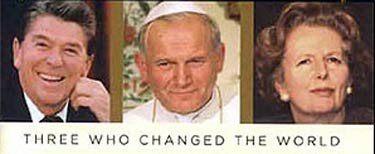Richard Fernandez reminds us that we need to mourn not only Margaret Thatcher’s departure, but even more the failure of the Trans-Atlantic democracies to live up to, and properly value, the legacy of greatness of the three leaders who defeated Communism.
Margaret Thatcher will not be remembered for that minor conflict which we call the Falklands War. It will be for her role in the fall of the Soviet Union.
And therein lies the crux of the matter. To understand the challenge — to hear the question — is perhaps the greatest obstacle to greatness on history’s stage.
The great achievement of Reagan, Thatcher, and the Pope lay in remembering that Communism was an evil thing. By that time it was conventional wisdom that the Soviet Union was permanent. And therefore their revolutionary act consisted, in the first place, of understanding the question. The reply they gave was not remarkable, just what most of us would say had we known the interrogative.
The three were poorly instructed in the by-then perfected art of moral relativism. The archived punditry is full of jibes attacking their failure to understand that their human imperfections disqualified them from exercising judgment, or that the defects of their societies necessarily compelled them into inaction.
To the chagrin of the intelligensia, the three still thought in the obsolete categories of “oughts†and “shoulds,†in the distinction between the normative and the normal. Fortunately for the world, they understood that the mud of creation was not a bar to the quest for paradise.
If there was greatness in Thatcher, it lay in the ability to hear the signal hidden from those too obsessed with their own greatness. It lay in being able to see the fastball over home plate that nobody else could see. Clinton, who lived in the aftermath of Reagan, John Paul II, and Thatcher, approached the problem as a question of how to spend the Peace Dividend; as a matter of how to remake the world now that his predecessors had cleared the way for him.
And he hit the ball he saw out of the park. Too bad if it was the wrong ball and the wrong park.
But if he wasn’t listening to history, maybe it wasn’t listening to him. And that’s too bad. Perhaps no one truly attains greatness by believing “it is in me.†Everyone who eventually gets there reaches it in surprise.
What made Margaret Thatcher noteworthy will not lie with her in the coffin, either to praise or — as is almost as certain — for her enemies to revile. The essence of her accomplishment was external to her. She only gave it a medium; a voice. Ronald Reagan perhaps put it best when he said: “There is no limit to what you can accomplish if you don’t care who gets the credit.â€
Thatcher ends her long life, the last of the three, at a moment when everyone is out of credit, or rather living on it. She passes in an uncertain hour, the story of her life and times a pointed reminder of how far we have fallen from those days.






Please Leave a Comment!